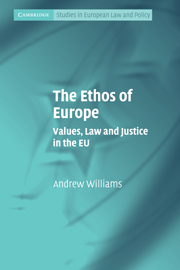8 - Towards the EU as a just institution
Published online by Cambridge University Press: 05 June 2012
Summary
Introduction
The book has been largely diagnostic up to this point. It has examined those salient values declared as fundamental in the EU. It has analysed how they have been applied and articulated institutionally. And it has provided an interpretation of the philosophy of law and the institutional ethos in this context. The conclusion I reached in the previous chapter was that an indeterminacy of value definition and appreciation prevails. Justice is absent as a coherent institutional theme. And the EU has suffered in any claim to being a ‘just institution’ as a result.
Of course, I have taken it as axiomatic that the EU should become (or improve as) a ‘just’ institution. But this seems to me a reasonable inference when we contemplate the extent to which the EU assumes sovereign powers from its Member States, how its law impacts upon its constituents, and how its policies and actions affect the lives and expectations of a multitude of people within and outside its borders. So long as this remains the case we cannot reasonably ignore questions of justice in relation to the EU. By extension, we cannot avoid assessing the Union in terms of its qualities as a just institution-in-being or in-the-making. If we do, its legitimacy will always be in question. The threat of an institution developing that is predisposed to tyranny (or at best a disregard for justice in its operations) will embed itself as a severe and perhaps debilitating critique.
- Type
- Chapter
- Information
- The Ethos of EuropeValues, Law and Justice in the EU, pp. 283 - 313Publisher: Cambridge University PressPrint publication year: 2010



